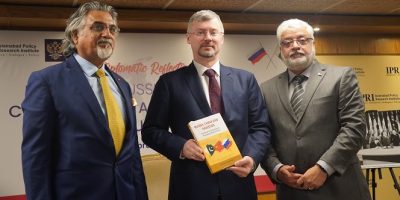Strict monitoring vital for sustainable tourism in new normal: experts

ISLAMABAD, JULY 25 (DNA) – Speaking to the participants of a national webinar on “Harnessing Sustainable Tourism Potential in the New Normal” experts and the civil society representatives urged the federal and provincial governments to develop monitoring mechanisms for the Standard Operating Procedures (SOPs) before opening the tourism sector.
We shall learn lessons from the previously opened sectors such as construction, trade centres and shops, and mosques where implementation of SOPs was hardly seen. Same or worse could be the case of opening the tourists’ destinations to what the recreation-starved mob is waiting for.
They said the opening of the tourism sector is imperative to contribute to revive the economy from grassroots level to the national. SOPs should be laid down for a well-monitored limited opening of the sector as a test case. Awareness raising on the new normal shall be the top priority while the SOPs monitoring should be done by the teams comprising officials of the district governments, police and civil society reps. Violators shall be punished strictly.
The national webinar was organized by the Development Communications Network (Devcom-Pakistan) and DTNTV on Saturday. It was hosted and conducted by Devcom-Pakistan Director Munir Ahmed.
Senator Mushahid in a statement said that we need to think about off the cuff strategies to attract international tourism. Our wonderful desserts, marines and coastal parts and high mountains could play centre of attraction. But unfortunately we cannot learn towards their recreational needs.
He however urged the need to have communities’ engagement in the implementation of SOPs after the tourism sector is opened.
Devcom-Pakistan Director said the implementation of SOPs would play a pivotal role in sustaining tourism in the coming days. So, all the stakeholders in hospitality and tourism operations should ensure complete compliance of the instructions without any ifs and buts. Thousands of lives would be at risk if the government and WHO SOPs are not followed and it would also hamper the economic activities engaged in the tourism business and local services.
Aftab Rana said: Sustainable tourism refers to a broad range of tourism ventures that take into account ideas of sustainable development. Importantly, sustainable tourism development is supply driven rather than demand driven with consideration given to social, economic and environmental factors.
Rana said Covid-19 has severely impacted on the economic side of tourism but it has also created an opportunity for the stakeholders of this industry to sit back for a while and think about the past mistakes and readjust strategies and plans to guard against past mistakes, and seriously consider to promote responsible tourism.
Kiran Afzal said in the times of COVID-19, the tourism industry has taken an unprecedented hit across the global with several industry stakeholders declaring this as the ‘first one affected and the last one to recover’. The research bodies have revised their initial ‘tourism receipts damages’ estimates from US$400 billion to a whopping US$900 billion. The World Bank’s own estimates confirm that South Asia is on its way to losing 10 million jobs in tourism and related sectors.
She said it is important for Pakistan to follow the relevant global practices including planning tourism bubbles; regulating tourist numbers; creating SOPs awareness in the visitors, communities, workers and local authorities and enforcing strict health safety regime for all who are at the risk of being exposed due to resumption of domestic travel. SMEs should be provided training for adapting to the new normal and repurposing the product and service lines to the extent possible. Public private partnerships will help the sector recover faster and develop resilience to future external shocks.
Shaaref Munir presented a ‘safe hospitality model’ from Istanbul (Turkey) and described in detail many aspects of how the Turkish tourism and hospitality sector is taking care of social distancing, and other preemptive measures. “It is the social awareness and professional approaches that are leading the Turkish safe hospitality practices to a success by reducing the risk factor”, he added.
Fayyaz Sheikh said all the government SOPs would be implemented in letter and spirit by the special teams formed to monitor the hotels and tour operations once the tourism sector is opened. We are having an active role of the private sector in the tourism sector management that would ensure all the SOPs followed in the better monetary benefits of their own.
Cdr Akhtar said Pakistan has immense opportunities for the maritime tourism that is untapped for unknown reasons. Plans and strategies are made but never implemented in letter and spirit. This sector also needs marketing and projection strategies for national and international tourists.
Dr Nilofar Jamil said Balochistan is the most neglected province. Many tourist destinations remain unexposed.
Ayesha Khan said the Hashoo Foundation has developed several community based projects that engages women and poor communities and tourism management and cultural dissemination.
Muhammad Iqbal said Gilgit-Baltistsan is very safe and the people are very hospitable. There is no risk of and security. He said the locals would implement the SOPs in letter and spirit. He urged to open the tourism sector as soon as possible.
Meraj Hamayun Khan said the women of Khyber Pakhtunkhwa could be engaged in many ways in the tourism promotion, guest reservations, digital communication, and housekeeping, but unfortunately never employed because of the stereotypes. KP should change its behavior towards women employment.DNA
============
Related News

Pakistan announces minimum Fitrana, Fidyah rates for 2026
ISLAMABAD, FEB 9: The Council of Islamic Ideology (CII) has announced the minimum rates forRead More

Russian ambassador outlines vision for deeper Pakistan ties
ISLAMABAD, FEB 9 /DNA/ – In a comprehensive address on the eve of Russia’s Diplomats’Read More


Comments are Closed